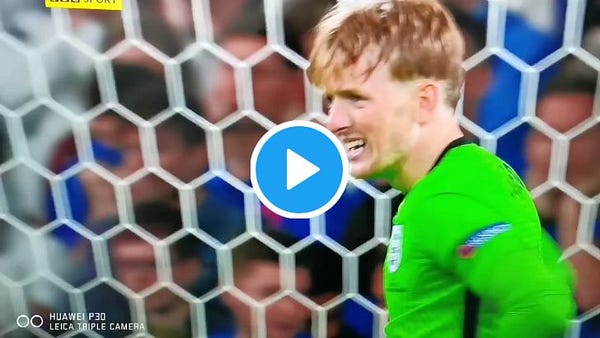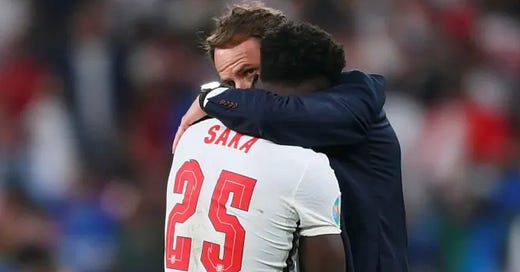Let’s get one thing clear here. This is not a return of England’s penalty curse. This is not England ‘reverting to type’ by losing another shoot-out. If anything, the events of the Euro 2020 final are the total opposite. Let me explain…
For a start, the (unsurprising) reaction of England coach Gareth Southgate to the Euro 2020 final defeat is unlike any of his predecessors. Every England coach whose team had preciously lost on penalties all said that the shoot-out is a lottery and can’t be practised (as did Didier Deschamps not so long ago). Southgate, who believes penalties are a trainable skill that can be improved, take the other view:
“It’s down to me. That is my responsibility. I chose the guys to take the kicks. I decided on the penalty takers based on what they’ve done in training, and nobody is on their own. But in terms of the penalties, that’s my call. It totally rests with me. We worked through them in training. That is the order we came to. We knew they were the best takers we had left on the pitch.”
Photo: Laurence Griffiths / Getty Images
This automatically changes the narrative. Defeat is not something that happened to England, with the players left to unfairly shoulder blame. Southgate’s words sum up his quiet form of leadership: with accountability, selflessness and integrity at its heart. It will help the players right now and in future. Southgate talks about owning the shoot-out. Even in defeat, he is owning this one.
The England penalties narrative really has come full circle: remember, this used to be a team that was so scared of penalties that World Cup 2006 opponents Portugal played for a shoot-out even though they had an extra player for an hour because they felt so sure of winning from 12 yards (sure enough, they won 3-1). Now, we are in a situation where it looks like England are actually playing for penalties. Talk about a turnaround!
Going into the shoot-out, the numbers were in England’s favour. Italy had beaten Spain in the semi-final but no team had ever won two shoot-outs in the same Euros tournament. England (1996), Poland (2016) and Switzerland (2020) all won one and then lost one. In World Cups, only Argentina (1990) and Croatia (2018) have won two shoot-outs in the same tournament.
If you add the Copa America (4/7 teams won successive shoot-outs), the African Cup of Nations (1/4), the Asian Cup (1/3) and the Gold Cup (1/3 win two), then only 9/26 teams win their second shoot-out in the same tournament, at a 35pc success rate.
Why might this be? Are the players less focused or too complacent before the second shoot-out? My friend Mourad pointed out the physiological affect of playing two games with extra-time; the players will be extra-fatigued by the time the second shoot-out comes around (in some cases, the climate or travel variables will also count against them). Does the other team have a better read on them having recently seen them take penalties? Of the four Italian players who took penalties in both shoot-outs, all switched sides:
Andrea Belotti vs Spain, natural side, scored; vs Eng, non-natural side, saved
Leo Bonucci vs Spain, non-natural side, scored; vs Eng, natural side, scored
Federico Bernadeschi vs Spain, natural side, scored; vs Eng, down the middle, scored
Jorginho vs Spain, non-natural side, scored; vs Eng: natural side, saved
Studies show winning shoot-outs is a habit: if a team lost its preceding shootout, players are more likely to miss their current shot; if a team won, they are more likely to score. But, it seemed, not so much is if the shoot-outs are in the same tournament.
This makes Italy’s achievement even more impressive: putting them alongside Cote d’Ivoire 1992, Saudi Arabia 1996 and Brazil 2004 as the only teams whose shoot-out triumphs were in the tournament semi-final and final.
And so to the pre-shoot-out huddle. Southgate, standing in the middle of a circle, looks like a form teacher taking registration: looking at his notepad, finding a player (sometimes turning full-circle), having a word, maybe allocating them a number, and getting a nod in return. First Philips, who has to put his hand up to get noticed; then Grealish; then Stones. Maybe he is reminding them where to kick as well. And next to him is Kieran Trippier, a scorer against Colombia but now subbed off, reminding the players to stay calm.
Photo: Getty Images
Then, the toss. Referee Bjorn Kuipers tosses the coin to choose the ends. The players have no say in this. One colour, and it’s one end; another, the other. Kuipers points to the end where England fans are. The first toss has gone England’s way – although studies say the end at which penalties are taken makes no difference to the result. Kane then chooses a side of the coin, and Kuipers tosses again. Kane gets it wrong, and Chiellini straightaway chooses to kick first. He knows that the team kicking first has an advantage – in this tournament, all four shoot-outs have been won by the team kicking first.
This caused former Spain defender Gerard Pique to appeal to revert to the ABBA format for penalties (although he was quieter after Spain kicked first and won against Switzerland).

The ABBA trial that took place between 2017 and 2019 is described in this piece by its instigator, the marvellous Prof. Ignacio Palacios-Huerta. In short, there were 36 shoot-outs in which ABBA was used: the team kicking first won 18, the team kicking second won 18. I’m told that people found the scoring system too complicated to follow and therefore it was quietly shelved.
As for the penalties: it’s impossible to be critical of those who stepped up. Southgate made his decision based on factors we haven’t seen, and I trust his judgement on that. It’s easy for Roy Keane to say this:
“If you are Sterling or Grealish you cannot sit there and have a young kid go ahead of you. You can’t sit there. That must be hard to take. You have to get in front of the young kid and say ‘I will step up before you.'
Or Jose Mourinho (penalty shoot-out winning record 2/9):
“Many times players that should be there run away from their responsibility. Where was Sterling? John Stones? Where was Shaw?”
And as Jack Grealish hinted at on Monday morning, we simply don’t know.


For all the criticism, let’s have a quick look at the numbers:
Raheem Sterling has scored 2/5 penalties in open play (including for England last September against Iceland), at 40pc success rate, and 2/3 in shoot-outs (one for England, kicking four, against Switzerland).
Jack Grealish is 0/1 in open-play penalties for Aston Villa, hitting the crossbar against Sheffield United in 2019. He did score in the Championship play-off semi-final shoot-out against WBA (and this fantastic piece points out he scored 16/16 in training for England U-21s).
A line about the substitutes. Again, it’s hard to be critical when Rashford (3/3 this season, plus one in the shoot-out against Villarreal) and Sancho (3/3 for Dortmund this season) are used to it. Data backs up my belief that bringing on a penalty specialist in extra-time can help teams in a shoot-out.
Playing Time / Conversion
1-30 mins / 87pc
30-90 mins / 82pc
91-120 mins / 78pc
There are some caveats on this: one, it’s a small sample of players who came on and took a penalty; two, the subs who came on in these situations would have been skilled at and willing to take a penalty; and three, anecdotally, players who have been in this position have told me they like to have a bit more time on the pitch to get used to the turf, the ball and the conditions. So playing for ten, or even five minutes, would be preferred to coming on and kicking the penalty with your first touch.
There have been so many positives for England to take from this tournament. I would say Southgate’s response to this defeat is another one.
PEN PALS:
A few spots from the shoot-out. Love this verbal affirmation from Jordan Pickford before Jorginho’s penalty. “No problem!”


This is perfectly-worded by Oliver Kay. Video footage shows the Italians celebrating around Saka, and Philips running from half-way to give him a hug. This is why England is in good hands for the future.

Please share any penalty thoughts or further questions to me either by commenting below or at @benlyt. This is the last edition of the season. Thank you for your support over the last 28 weeks and have a great summer!
Ben Lyttleton is the author of Twelve Yards: The Art and Psychology of the Perfect Penalty






Hi Ben Lyttleton why havent u posted any new articles since the start of the season
Can you clarify your analysis of what was happening with Stones, Grealish and Phillips. Do you think they were next in line after Saka? Was Southgate just seeing who would be up for taking one and then he made his decision on the first 5?